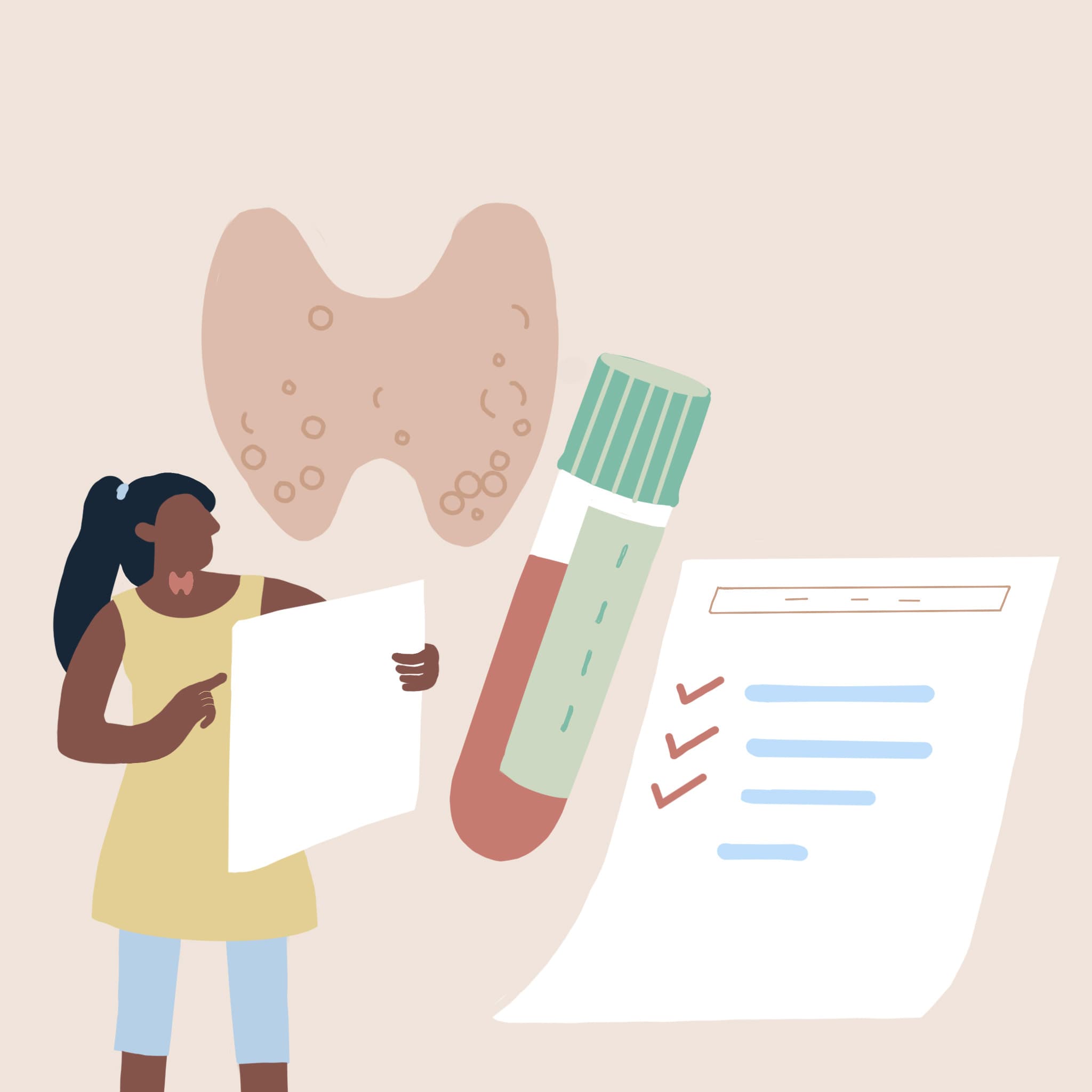This article is compiled by Sanjana Varma, a freelance writer at Proactive For Her.
What is the thyroid gland and how does it work?
The thyroid gland is located in the front of your neck. The two lobes of the thyroid gland appear on either side of your windpipe, joined by a small bridge of thyroid tissue called the isthmus. The thyroid secretes two main hormones into the bloodstream.
- One of these is thyroxine (T4), which contains four atoms of iodine. T4 is converted to tri-iodothyronine(T3), which contains three atoms of iodine.
- T3 is biologically active and regulates your body’s metabolism.
The pituitary gland which lies underneath your brain produces a hormone called thyroid-stimulating hormone (TSH) which regulates the amount of T4 and T3 secreted by your thyroid gland. The pituitary is like a “master switch”, which senses the level of thyroid hormones in your bloodstream. If the level drops just a little below normal the pituitary reacts by secreting more TSH, which in turn activates the thyroid gland to produce more thyroid hormones. When the thyroid hormone levels rise above normal, the pituitary stops secreting TSH so that the thyroid makes less T4. This is like a feedback loop.
What are thyroid function tests?
TSH, T4 and T3 blood tests are usually recommended to diagnose thyroid diseases. A blood sample from a vein is taken for analysis by the lab. Laboratories use reference ranges to compare blood test results with results in the normal healthy population.
Total T4 (TT4) and Total T3 (TT3) levels measure bound and free thyroid hormone in the blood. These levels are influenced by many factors that affect protein levels in the body, including medications, sex hormones, and liver disease.
The normal ranges are given below:
- Normal range for thyroid-stimulating hormone(TSH): 0.4-4.0 mU/L.
- Normal range for TT4: 5-12mcg/dL
- Normal range for TT3: 80-220 ng/dL
A pregnant woman’s normal thyroid range is different from that of the general adult population and should ideally be based on reference ranges derived from healthy pregnant women in the same population. Usually the target of TSH level is 2.5 mU/L and below. The ranges listed here are only a guide and will vary slightly according to the laboratory.
How can blood tests be used to diagnose thyroid disorders?
The test determines your thyroid health. Based on the level of your thyroid gland and other symptoms, the doctor will prescribe medications or further tests as required. If it is within the normal range, you don’t need to worry about your thyroid.
Decoding the results
If the TSH level is high and the T4 result is low this suggests that you may have hypothyroidism due to underactive thyroid glands. If the TSH level is low and the T4 result is high this suggests that you may have hyperthyroidism due to overactive thyroid glands. Both the situations usually require treatment.
If the TSH level is slightly raised but the T4 level is still within the normal reference range this is called subclinical hypothyroidism or mild thyroid failure. It may develop into overt or clinical hypothyroidism later. Your doctor may call for additional tests for thyroid antibodies to determine the risk.
Thyroid antibody tests
In case the initial test results revealed any signs of thyroid dysfunction and the doctor needs to rule out autoimmune thyroid disease, they may call for one or more thyroid antibody tests like:
- thyroid peroxidase antibodies (TPOAb)
- thyroglobulin antibodies (TgAb)
- thyroid-stimulating hormone receptor antibodies (TSHR Ab, also known as TRAb).
There is no standard reference range for thyroid antibodies because this depends on many different factors.
Can blood tests be used to manage thyroid disorders?
After you start the prescribed treatment, taking tests as recommended by your doctor will help you to gauge the effectiveness of the treatment. Always remember to keep your thyroid level within the permissible range for better health.
Your doctor may carry out blood tests usually every few weeks at the beginning of the treatment. This will help to fine-tune your treatment. The frequency of your tests will reduce once your thyroid level reaches normalcy. In hypothyroidism, a TSH test once a year will check that levels are within the reference range, move stable. In hyperthyroidism the usual tests are TSH and FT4; how often these take place will depend on the treatment. Based on the results your doctor will adjust the dosage of your medicine. You should never change your dosage without consulting your doctor.
What can affect the results of thyroid function tests?
Thyroid function tests can be influenced by pregnancy, medications and illnesses. Tell your doctor if you are taking any medication, as some medicines can alter the test results and how they are interpreted. It is also important to mention if you have had any X-ray tests that have used a special contrast dye, as this may contain iodine which can affect the results. Levels of thyroid hormones change in pregnancy, so tell your doctor if you are pregnant when the test was taken.
How often should I have a thyroid function blood test?
You should have a blood test once a year, or more frequently if your doctor advises. People with Down’s syndrome, Turner syndrome, Addison’s disease or other autoimmune diseases should also be tested regularly.
What should I do to prepare for a thyroid function test?
Thyroid function tests usually require very little preparation. You don't need to fast before the blood test. It doesn't matter if you have taken your thyroid medicine just before the blood test.
Final thoughts
Thyroid disorders usually run in families. If you suspect that you have a thyroid disorder, it is advisable to visit your doctor and take the test. The test result will determine your treatment if required. Blood tests are currently the most accurate way to diagnose and manage thyroid disorders
If you have a diagnosed thyroid disorder or have had previous treatment for an overactive thyroid, it is important to have a blood test every 12 months, or as advised by your doctor. If you are planning to get pregnant, make sure you check your thyroid in early pregnancy ( especially if you have thyroid problems) or when you are trying to conceive. Please don’t alter your dose without your doctor’s approval. A slight variation may trigger the disorder to come back in full swing. Thyroid disorders are easy to manage and track with the correct medication.
Disclaimer - This information is provided for educational purposes and should not be construed as medical advice. Please consult with your healthcare practitioners before undertaking any changes in your diet or adding supplements.
Proactive is a digital clinic for women, offering accessible, personalized, and confidential health-care solutions. We offer products and services for out-patient health concerns of Indian women, across their lifetime - from puberty to pregnancy to menopause. To know more on the sexual and reproductive health of women, visit https://www.proactiveforher.com/

